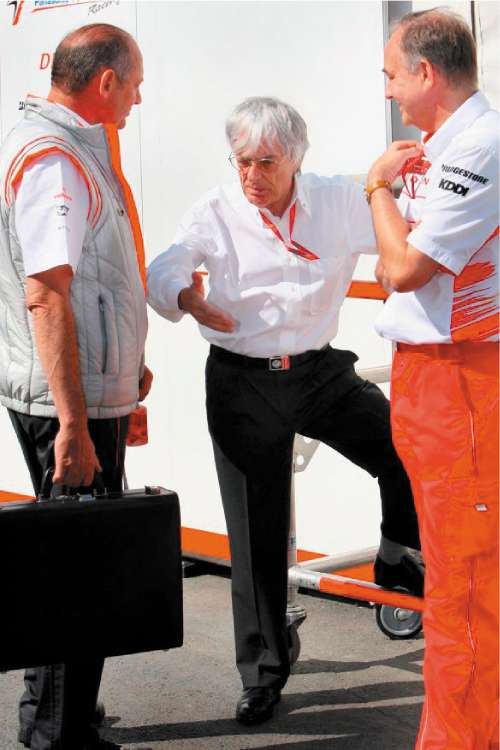Mosley vies for upper hand in F1's money wars

Your support helps us to tell the story
From reproductive rights to climate change to Big Tech, The Independent is on the ground when the story is developing. Whether it's investigating the financials of Elon Musk's pro-Trump PAC or producing our latest documentary, 'The A Word', which shines a light on the American women fighting for reproductive rights, we know how important it is to parse out the facts from the messaging.
At such a critical moment in US history, we need reporters on the ground. Your donation allows us to keep sending journalists to speak to both sides of the story.
The Independent is trusted by Americans across the entire political spectrum. And unlike many other quality news outlets, we choose not to lock Americans out of our reporting and analysis with paywalls. We believe quality journalism should be available to everyone, paid for by those who can afford it.
Your support makes all the difference.Formula One is bracing itself for the outbreak this week of a war that could tear it apart. Tomorrow the FIA World Motor Sport Council will meet in Paris to discuss a proposal that could trigger a fight for control of the sport between former collaborators Max Mosley and Bernie Ecclestone and the latter's commercial rights-holding partner, CVC Capital Partners.
The proposal is believed to include the suggestion that Mosley will only sign the FIA to a new Concorde Agreement (the document by which the sport has historically been run since the FISA-FOCA war of 1981 which finally cemented Ecclestone's control of the commercial side) if all parties agree to a substantial redistribution of the wealth within Formula One.
A cornerstone of the FIA's new "white knight" proposal is the assertion that insufficient revenue from Formula One finds its way back into the sport. Mosley, who is trying to position himself as somebody whose continued presence is essential to the sport's wellbeing, seeks a fresh agreement under which the teams will share the majority of the race fees and two-thirds of the TV revenues.
At present they get only 50 per cent of all revenues generated by the Formula One Group. Mosley's proposal would raise the figure closer to 75 per cent.
There are suggestions that a rise of this magnitude could have serious implications on CVC's ability to finance debt payments on the loan it took out from RBS and Lehman Brothers, which was secured on the future profits of Formula One. The proposal is designed to make Mosley more attractive to the teams after the recent sex scandal that tarnished his reputation. While many have deliberately distanced themselves from him in the fallout from that episode, there is one cold, hard fact that is indisputable within the sport: money talks.
That is why Ecclestone has for so long enjoyed the support of the teams, many of whose owners he has made extremely wealthy since the early Eighties.
There is also a broader agenda. The teams want more transparent governance to appease sponsors who are increasingly aware of the need to appear squeaky clean. Since he so convincingly won the recent vote of confidence at the FIA Extraordinary General Assembly, which kept him in power, Mosley has again been pushing former Ferrari team principal Jean Todt as his most suitable replacement (though many paddock dwellers believe that Mosley will stand for another four-year period when he comes up for re-election in October 2009).
Effectively, Mosley is trying to play Ecclestone at his own game, by currying favour with the teams. Some will undoubtedly be attracted by the idea of a greater share of the revenue, while others have indicated that they will wait and see which way the cards fall if Mosley and Ecclestone – long-time allies who have each benefited strongly from the other's acumen – really are at war.
Some believe that a compromise can be found, and that Ecclestone and CVC may simply relax the purse strings. The former agreed to do so back in 1997 when Ron Dennis and Sir Frank Williams, of McLaren and Williams respectively, demanded a greater share. Subsequently, however, their claims were unsuccessful. The FIA owns the official World Championship, and is thus at an advantage given the difficulties associated with starting a breakaway series, which has been suggested in recent weeks.
As both Mosley and Ecclestone know from the days when they bluffed former FIA president Jean-Marie Balestre to back down in 1981, when they themselves were only days away from surrender, starting something new is fraught with problems.
By tomorrow, a clear image should emerge of the true nature of the battle that is shaping up.
Join our commenting forum
Join thought-provoking conversations, follow other Independent readers and see their replies
Comments